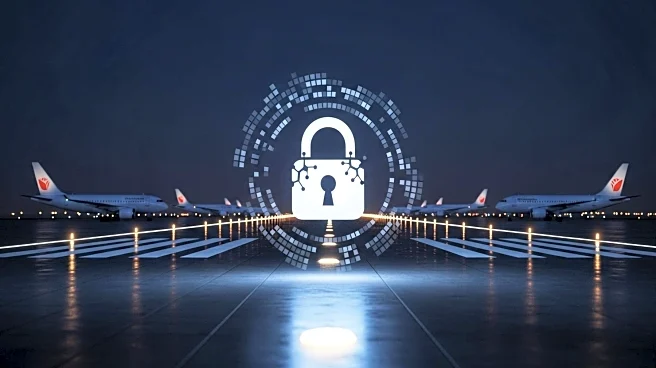What is the story about?
What's Happening?
A cyberattack has disrupted operations at major European airports, including Berlin's Brandenburg Airport, Brussels, and London's Heathrow. The attack targeted check-in and boarding systems, leading to significant delays and cancellations. The disruption forced airports to revert to manual processes, causing longer waiting times for passengers. Collins Aerospace, the service provider for the affected systems, confirmed the cyber-related disruption to its MUSE software, which is used for passenger handling. The attack has impacted thousands of passengers, with at least 10 flights canceled and 17 delayed at Brussels Airport alone. The aviation sector has seen a significant increase in cyberattacks, with a 600 percent rise from 2024 to 2025, making it a prime target for such disruptions.
Why It's Important?
The cyberattack highlights the vulnerability of critical infrastructure in the aviation sector, which increasingly relies on interconnected digital systems. The disruption not only affects passengers but also poses a significant challenge to airport operations and security. The incident underscores the need for robust cybersecurity measures to protect against such attacks, which can have widespread economic and logistical impacts. Airlines and airports may face financial losses due to flight cancellations and delays, while passengers experience inconvenience and potential financial burdens. The attack also raises concerns about the potential for more severe disruptions in the future, emphasizing the importance of cybersecurity in maintaining the integrity of global air travel.
What's Next?
Airports and airlines are working to restore normal operations and minimize the impact on passengers. Collins Aerospace is actively addressing the issue to restore full functionality. Meanwhile, affected airports have advised passengers to check flight statuses with their airlines before traveling. The incident may prompt a review of cybersecurity protocols and investments in more resilient systems to prevent future attacks. Stakeholders, including government agencies and industry leaders, may collaborate to enhance cybersecurity measures and share intelligence to mitigate risks. The aviation industry may also face increased scrutiny and regulatory pressure to ensure the security of its digital infrastructure.
Beyond the Headlines
The cyberattack raises ethical and legal questions about accountability and the protection of critical infrastructure. It highlights the need for international cooperation in addressing cybersecurity threats, as such attacks can have cross-border implications. The incident may also influence public perception of air travel safety and the reliability of digital systems, potentially affecting consumer confidence. Long-term, the aviation industry may need to balance technological advancements with security considerations to ensure safe and efficient operations.















